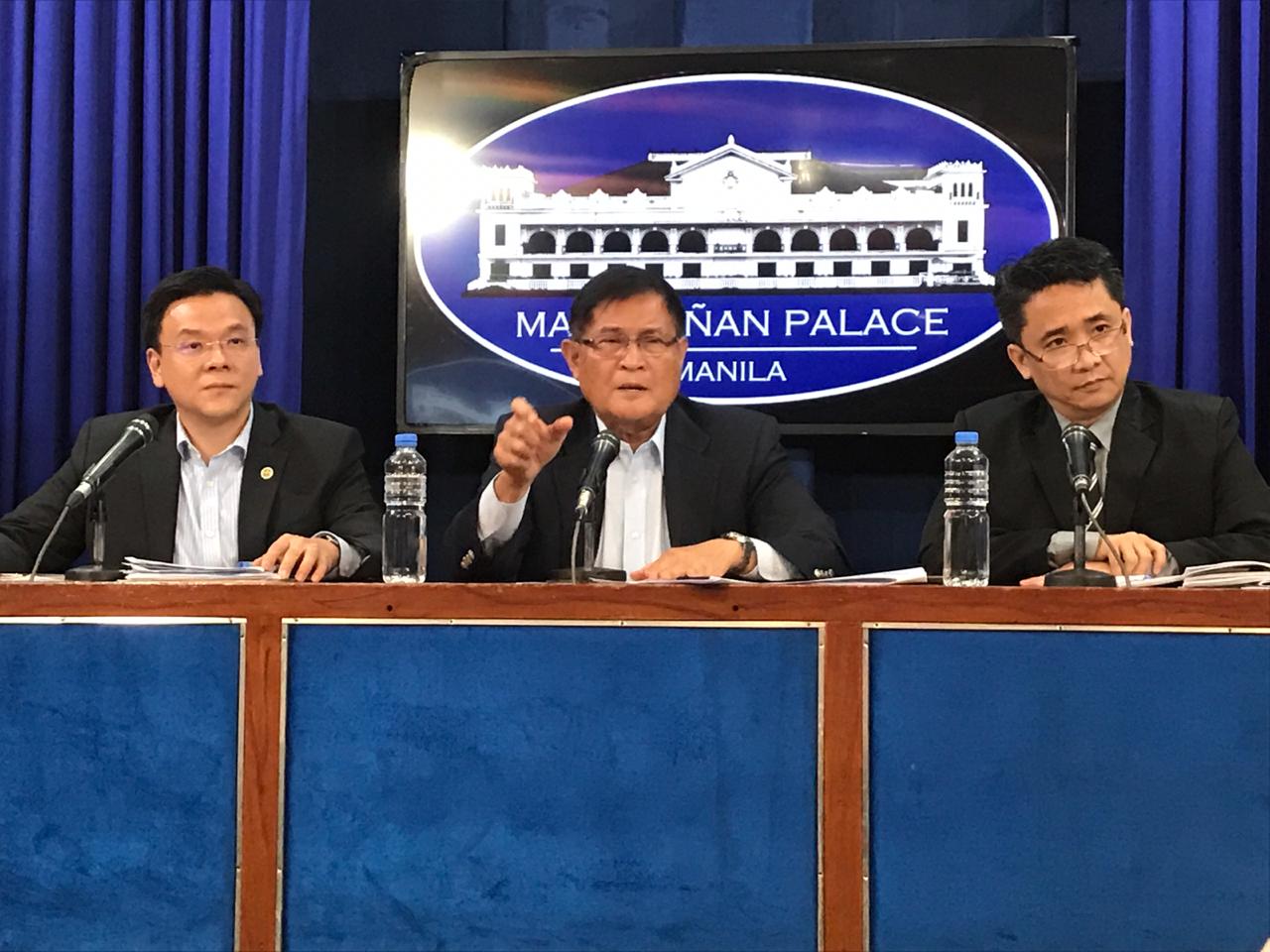
MWSS Administrator Reynaldo Velasco (center) responds to media questions during a briefing on Wednesday, March 20, 2019, after their meeting with President Rodrigo Duterte on Tuesday night. INQUIRER.net/Nestor Corrales
The head of the Metropolitan Waterworks and Sewerage System (MWSS) was ready to step down on Tuesday night when he and other MWSS officials met with President Rodrigo Duterte, but he changed his mind because the President did not seek his resignation.
“We serve at the pleasure of the President. I would take responsibility and offer to resign, but [he did not raise the issue],” MWSS Administrator Reynaldo Velasco said on Wednesday at a press briefing in Malacañang. “That’s why I’m still here.”
Velasco said the President had given the MWSS officials a chance to fix the problem.
The regulatory agency is under fire for the water shortage in eastern Metro Manila and parts of Rizal province serviced by concessionaire Manila Water Co.
Congressmen have called on the President to fire the MWSS officials for failing to avert the water crisis.
Velasco said the water shortage had already eased and supply was available in 95 percent of the service area of Manila Water and would hit 99 percent by the end of the month.
“I will try to resolve it. If I cannot do it, I will resign,” he told reporters.
Scolding
At the meeting in Malacañang “that was more of a presidential monologue,” according to presidential spokesperson Salvador Panelo, the President scolded the MWSS officials, as well the two water concessionaires in Metro Manila, for the water shortage.
In a statement, Panelo said the President threatened to sack the officials and terminate the contracts of Manila Water and Maynilad Water Services Inc.
He said the President ended the meeting by ordering them to submit a report on the water situation before April 7, “after which he will decide whether heads will roll or whether the contracts of the concessionaires will be terminated.”
Public anger, compensation
MWSS chief regulator Patrick Ty said he continued to do his job despite the public anger.
“I understand the sentiment of the public, everyone is angry,” Ty told the Inquirer. “We are up to the challenge.”
Members of Akbayan-NCR on Wednesday picketed the Manila Water building in Quezon City, demanding that customers’ charges from the concessionaire be waived.
Akbayan members who are clients of Manila Water are pushing for a “people’s water bill” that included compensation for the inconvenience they experienced.
At the House of Representatives, the committee on public accounts directed the two water concessionaires to consider rebates for all consumers and compensation for those directly affected by the water shortage.
Kid-glove treatment
Lawmakers took turns at scolding the MWSS over its kid-glove treatment of Manila Water and Maynilad for violations of their 25-year concession agreements.
Ako Bicol Rep. Alfredo Garbin Jr. chided the agency officials’ failure to impose penalties on the water companies’ missed contract obligations.
Buhay Rep. Jose Atienza scored the concessionaires for passing the blame on consumers by saying that the water shortage was caused by increasing population and residents resorting to “panic storage.”
“They are into this business of providing water, so their business model must have predicted the increase in population,” Atienza said.
‘Best solution’
At the press briefing, Velasco reiterated that building the China-funded Kaliwa Dam was the best solution as it would offer long-term supply for the metropolis and adjacent provinces.
While construction could take four years, he said he would insist that the contractor build the dam and the conveyance tunnel at the same time so that these could be operational in two years.
The MWSS administrator said other short-term measures were being taken and medium-term solutions were being pursued.
For immediate results, Velasco said Manila Water should activate its plant in Cardona, Rizal, to filter water from Laguna Lake and produce at full capacity 100 million liters daily (MLD).
The plant had been plagued by technical problems.
In a statement, Manila Water said its Cardona plant had begun operation but was producing only 24 MLD.
Officials said Manila Water’s supply deficit averages 140 MLD and peaks at 200 MLD. —With a report from Mariejo S. Ramos